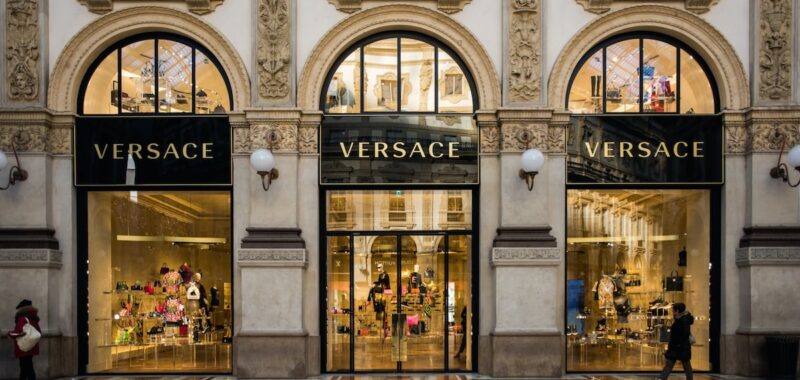
Fashion executive John Idol thought Versace leaned too much on ornate designs and aimed to fix it by dialling things down, then boosting prices.
When his company, Capri Holdings Ltd., acquired the fashion house in 2018, he said his strategy would double the brandâs revenue over the next decade. Six years later, that vision has unraveled. Heâs sold Versace to Prada SpA for $1.38 billion, a roughly $700 million loss, and sales growth is significantly off course.
Capri is expecting Versace to report revenue of around $813 million in the current fiscal year that ended in March. Thatâs below the $843 million in sales it reported in fiscal year 2020, the first full year that Capri was running the brand.
Versaceâs future now rests with Prada, a company thatâs nimbly navigated the recent slowdown in luxury spending. Revenue at Prada, which also includes the Miu Miu brand, rose 17 percent in 2024. By contrast, analysts surveyed by Bloomberg expect Versace to report a decline of around 20 percent in sales for the fiscal year that ends in March versus the prior year. Capri also owns the Michael Kors and Jimmy Choo brands, which have reported sales declines, too.
Capri said in a statement on Thursday announcing the deal that it would use the proceeds from the Versace sale to make investments in Michael Kors.
âWe also believe a sale of Jimmy Choo would be the right move for Capri,â Bernstein analyst Aneesha Sherman wrote in a research note Thursday.
When Idol took over Versace, the brand was known for its ornate designs and its signature Barocco print, but he later steered it toward the more muted âquiet luxuryâ trend. Idol said the shift was necessary because Versace had become overreliant on the print. âYou donât want a store that is 70 percent Barocco â and that became a bit of a crutch for the company,â Idol, who is chairman and chief executive officer of Capri, told analysts in February.
He also acknowledged the shift was too abrupt. While affluent shoppers embraced the more muted designs, the mid-tier shoppers who drive Versaceâs sales did not. Revenue growth started to slow.
âItâs not been the turnaround story that they wanted it to be,â Sherman said in an interview. âThe strategies havenât been the right strategies.â
Compounding the problem, Versace hiked prices and reduced the amount of affordable items it sold. âWe went too far, too fast,â Idol said in February. âCustomers who used to shop with us came in and said, âI like that, but I canât afford all of that,ââ Idol said. âProbably the customers are sitting there saying, âWait a minute. What happened to the old Versace?ââ
Now, Versace is scrambling to undo the damage. The brand is lowering price points on some core items: In the fall, silk shirts will start at $990 instead of around $1,500, the company told Bloomberg News, and its sneakers have become more affordable. Its Galaxia style, for example, starts at $550.
The brand also reduced discounts. While end-of-season sales on apparel and footwear still start at 50 percent, the second markdown is now 60 percent, the company said, versus 70 percent in the past. And Versace stopped putting handbags on sale at its full-price boutiques.
The shift âis painful,â Idol said, âbut it is the right thing to do.â
In March, the company announced that Donatella Versace was stepping down as chief creative officer, a role sheâs held since 1997. Sheâs become chief brand ambassador and supports the companyâs philanthropic efforts. Former Miu Miu executive Dario Vitale succeeded her on Apr. 1.
âWe are confident that his talent and vision will be instrumental to Versaceâs future growth,â Idol said about Vitale in a statement.
Capriâs chief financial officer Thomas J. Edwards left in April for the role of CFO and chief operating officer at Macyâs Inc. âHis departure comes at a precarious time,â Telsey Advisory Group analyst Dana Telsey wrote in a research note. âLeadership transitions always carry an element of risk.â
Risks have increased further, and Capriâs shares have fallen further since President Donald Trump pledged to implement sweeping tariffs.
Pyrrhic Victory
The sale of Versace to Prada is a Pyrrhic victory for Idol, who has led Capri since 2003. Wall Street cheered when Idol appeared to have found a potential buyer for Versace: Capri shares rose on Mar. 3 after Bloomberg News reported on the deal talks.
But Idolâs plan wasnât to split Capri into pieces. He aimed to sell the whole company to Tapestry Inc., which owns Coach and Kate Spade, for $8.5 billion in 2023. That would have afforded Idol a grand exit after decades at the helm of Capri. What could have been a crowning achievement, though, was toppled last year when a federal judge ruled the combination of the rival conglomerates would harm competition in the US handbag market.
Idol, 66, had already tried to take steps to ease out of his day-to-day CEO role in 2021. Capriâs board appointed Joshua Schulman to lead the company so Idol could move on to become executive chairman. Several months later, in an unexplained and surprising about-face, Capri said Schulman was leaving the company and Idol would remain CEO and chairman.
While the battle over Tapestryâs acquisition of Capri was playing out in the courts, Idol and his team didnât appear to be drawing up a Plan B for their remaining brands.
âThe company used the excuse of the deal with Tapestry for its inertia,â GlobalData analyst Neil Saunders wrote in a research note in February. âThat excuse is no longer viable, and the company needs to do the heavy lifting of reinvention.â
By Jeannette Neumann

